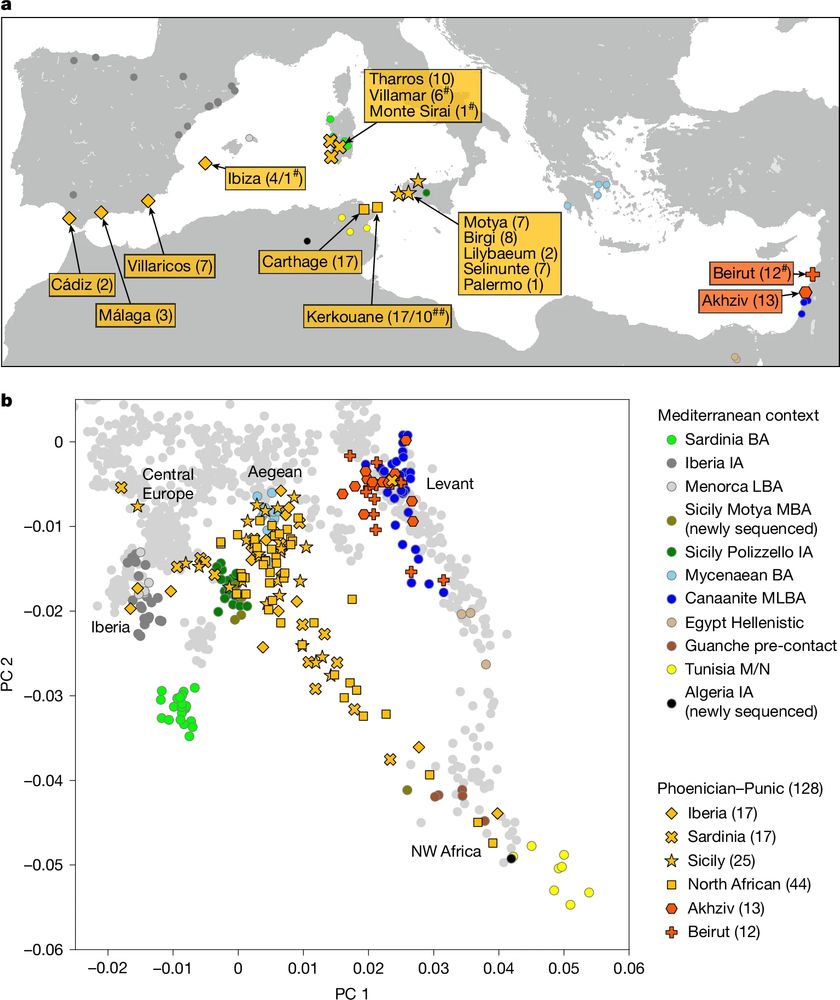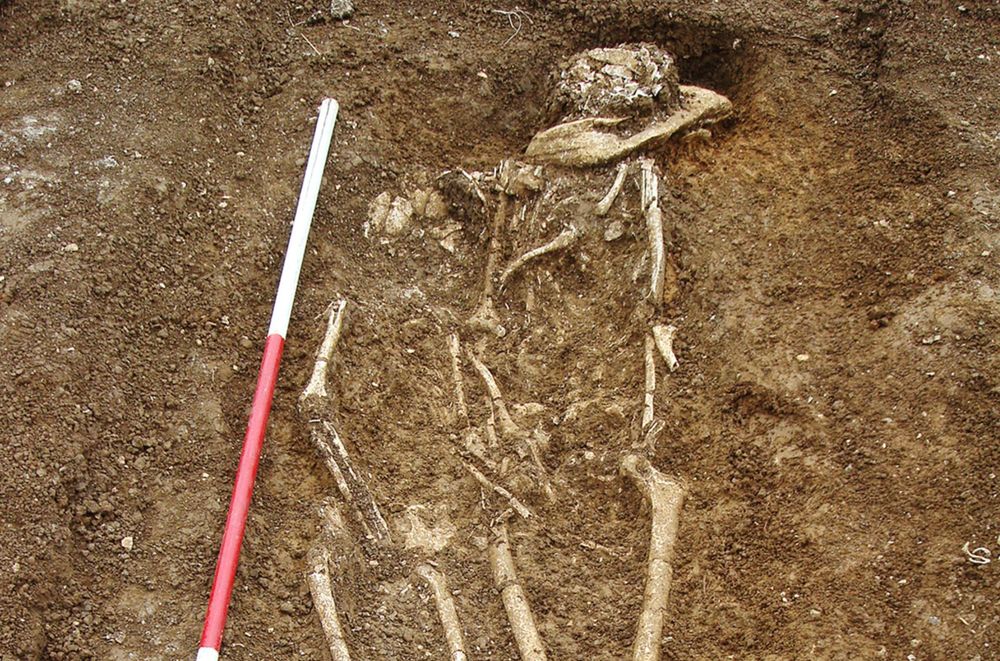
Research Group Leader at MPI-EVA Leipzig
www.hringbauer.com

We find that their Levantine Phoenician cultural ancestors contributed surprisingly little ancestry to Punic sites in the central and western Mediterranean! (1/4)
doi.org/10.1038/s415...
#aDNA #PopGen #Punic #Phoenician
Seven Millennia of Human Exploitation drove genomic Changes in Iberian Sheep
Comments welcome! 🧬🧪🏺🐑
www.biorxiv.org/content/10.6...
🧵(1/8)
Seven Millennia of Human Exploitation drove genomic Changes in Iberian Sheep
Comments welcome! 🧬🧪🏺🐑
www.biorxiv.org/content/10.6...
🧵(1/8)
Our study "Assessing Ancient DNA Sampling Strategies for Natural Selection Inference in Humans Using Allele Frequency Time Series Data" is now out in GBE! doi.org/10.1093/gbe/... @genomebiolevol.bsky.social @cegamorim.bsky.social

Our study "Assessing Ancient DNA Sampling Strategies for Natural Selection Inference in Humans Using Allele Frequency Time Series Data" is now out in GBE! doi.org/10.1093/gbe/... @genomebiolevol.bsky.social @cegamorim.bsky.social
Great lead by Kat!!
Theory & a practical guide to structural variants in popgen🧬
Many thanks to my co-authors: @rebekahoomen.bsky.social
@annatigano.bsky.social @marenwellenreuther.bsky.social @janawold.bsky.social @dlfield.bsky.social @clairemerot.bsky.social
onlinelibrary.wiley.com/doi/10.1111/...

Great lead by Kat!!
doi.org/10.32942/X28...
A systematic review of 2,861 articles shows that, even in 2025, 75% of such studies use microsatellites. And most use only a few!
#PopGen

doi.org/10.32942/X28...
A systematic review of 2,861 articles shows that, even in 2025, 75% of such studies use microsatellites. And most use only a few!
#PopGen
#aDNA #Labwork
Get in touch if you are interested in applying with a project on the evolution of humans and domestic animals using ancient and/or modern DNA 🧪🏺
www.scilifelab.se/data-driven/...

Get in touch if you are interested in applying with a project on the evolution of humans and domestic animals using ancient and/or modern DNA 🧪🏺
www.scilifelab.se/data-driven/...
#LLM science summaries were nearly five times more likely than human-authored science summaries to contain broad generalizations (95% CI [3.06, 7.70], p < 0.001).
And newer models over-generalized more; not less!
doi.org/10.1098/rsos...
#philSci
#LLM science summaries were nearly five times more likely than human-authored science summaries to contain broad generalizations (95% CI [3.06, 7.70], p < 0.001).
And newer models over-generalized more; not less!
doi.org/10.1098/rsos...
#philSci

Well, wonder no more!
(Project led by Yu Mo, with @smishra677.bsky.social and @yadirapga.bsky.social)
"No molecular evidence for Muller's ratchet in mitochondrial genomes"
www.biorxiv.org/content/10.6...

Well, wonder no more!
(Project led by Yu Mo, with @smishra677.bsky.social and @yadirapga.bsky.social)
"No molecular evidence for Muller's ratchet in mitochondrial genomes"
www.biorxiv.org/content/10.6...

buff.ly/K7CGFLV

buff.ly/K7CGFLV
PRIEST: No, the GPS says we have to keep going—
SKULL: I KNOW A SHORTCUT
PRIEST: Do you remember the last ti—
SKULL: FOR THOSE WITH FAITH, NO EVIDENCE IS NECESSARY; FOR THOSE WITHOUT IT, NO EVIDENCE WILL SUFFICE
PRIEST: No, the GPS says we have to keep going—
SKULL: I KNOW A SHORTCUT
PRIEST: Do you remember the last ti—
SKULL: FOR THOSE WITH FAITH, NO EVIDENCE IS NECESSARY; FOR THOSE WITHOUT IT, NO EVIDENCE WILL SUFFICE
Can I interest you in some cats?
Perhaps a complete retelling of cat domestication, dispersal, and replacement across Eurasia?
As you wish!
Science
www.science.org/doi/10.1126/...
Cell Genomics
www.cell.com/cell-genomic...

Can I interest you in some cats?
Perhaps a complete retelling of cat domestication, dispersal, and replacement across Eurasia?
As you wish!
Science
www.science.org/doi/10.1126/...
Cell Genomics
www.cell.com/cell-genomic...

More importantly, the scientific value of this media campaign, balanced against the possible stigmatization of individuals with these real conditions today, is highly questionable. edition.cnn.com/2025/11/13/s...

More importantly, the scientific value of this media campaign, balanced against the possible stigmatization of individuals with these real conditions today, is highly questionable. edition.cnn.com/2025/11/13/s...
More importantly, the scientific value of this media campaign, balanced against the possible stigmatization of individuals with these real conditions today, is highly questionable. edition.cnn.com/2025/11/13/s...

www.biorxiv.org/content/10.1...

www.biorxiv.org/content/10.1...
New paper led by Javier Maravall on a time transect from ancient Argentina.

New paper led by Javier Maravall on a time transect from ancient Argentina.
@genscapelab.bsky.social, @nirajrai.bsky.social, @cdelafc.bsky.social, @jaurban2204.bsky.social, @mootspoints.bsky.social
www.science.org/doi/10.1126/...

@genscapelab.bsky.social, @nirajrai.bsky.social, @cdelafc.bsky.social, @jaurban2204.bsky.social, @mootspoints.bsky.social

📄Global impact of micronutrients in modern human evolution

I also received an a NNF Emerging Investigator grant to use genomics + machine learning to study extinction.
👉 PhD & Postdoc positions coming soon — follow for updates!
Reposts appreciated 🙏

I also received an a NNF Emerging Investigator grant to use genomics + machine learning to study extinction.
👉 PhD & Postdoc positions coming soon — follow for updates!
Reposts appreciated 🙏



